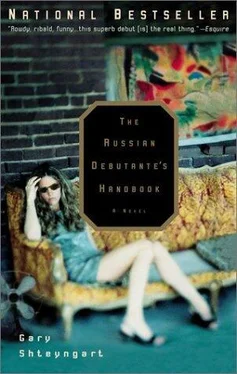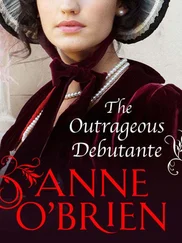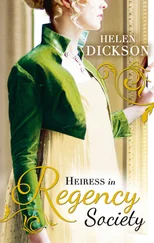Gary Shteyngart - The Russian Debutante's Handbook
Здесь есть возможность читать онлайн «Gary Shteyngart - The Russian Debutante's Handbook» весь текст электронной книги совершенно бесплатно (целиком полную версию без сокращений). В некоторых случаях можно слушать аудио, скачать через торрент в формате fb2 и присутствует краткое содержание. Город: New York, Год выпуска: 2003, ISBN: 2003, Издательство: Riverhead Books, Жанр: Современная проза, Юмористическая проза, на английском языке. Описание произведения, (предисловие) а так же отзывы посетителей доступны на портале библиотеки ЛибКат.
- Название:The Russian Debutante's Handbook
- Автор:
- Издательство:Riverhead Books
- Жанр:
- Год:2003
- Город:New York
- ISBN:0-7865-4177-6
- Рейтинг книги:4 / 5. Голосов: 1
-
Избранное:Добавить в избранное
- Отзывы:
-
Ваша оценка:
- 80
- 1
- 2
- 3
- 4
- 5
The Russian Debutante's Handbook: краткое содержание, описание и аннотация
Предлагаем к чтению аннотацию, описание, краткое содержание или предисловие (зависит от того, что написал сам автор книги «The Russian Debutante's Handbook»). Если вы не нашли необходимую информацию о книге — напишите в комментариях, мы постараемся отыскать её.
and
. The Russian Debutante’s Handbook Bursting with wit, humor, and rare insight,
is both a highly imaginative romp and a serious exploration of what it means to be an immigrant in America.
The Russian Debutante's Handbook — читать онлайн бесплатно полную книгу (весь текст) целиком
Ниже представлен текст книги, разбитый по страницам. Система сохранения места последней прочитанной страницы, позволяет с удобством читать онлайн бесплатно книгу «The Russian Debutante's Handbook», без необходимости каждый раз заново искать на чём Вы остановились. Поставьте закладку, и сможете в любой момент перейти на страницу, на которой закончили чтение.
Интервал:
Закладка:
She took a square of aluminum foil from her pocket from which were unfolded several pills. These were expertly swallowed without water. “Here, a tissue…” he muttered. Inwardly he was worried that his member’s smallness had made her cry, and he pressed her to him all the more violently.
“What’s the matter, hm? What’s this all about?”
“I’ll tell you a little secret,” she said, hiding her face in his scruffy guayabera. “A secret which you can never repeat. Promise?”
He promised.
“The secret is… Ah, but don’t you know it already? I was afraid you might have guessed it by now. What with the way I was carrying on about those vacuum cleaners at the Whitney…”
The concerned Vladimir was in no mood for frivolity. “Please,” he said, waving his arms. “What is the secret?”
“The secret is: I’m really not too bright.”
“You’re the smartest woman I’ve ever met!” Vladimir shouted.
“But I’m not,” she said. “Why, in some ways I’m worse off than you are. At least you have no tangible ambitions. All I am, on the other hand, is the very obvious product of two hundred thousand dollars spent on Fieldston and Columbia. Even my father says I’m stupid. My mother would confirm it, only she’s an idiot herself. It’s the curse of the female Ruoccos.”
“Your father would never say that,” Vladimir said, quickly forgetting the bit about himself having no ambitions. “Look at you. You’re only an undergraduate, but already you have such clever academic friends. And they think the world of you.”
“It’s one thing to be social, Vladimir. Or even to be smarter than average. And, entre nous, how frightening what passes for average these days. But to be brilliant like my father! Vladimir, do you know what he’s doing at City College?”
“He’s teaching history,” Vladimir said brightly. “He’s a history professor.”
“Oh, no, he’s so much more than that. He’s starting a whole new field. Evolving a whole new field, I should say. It’s called Humor Studies. It’s better than brilliant, it’s thoroughly unexpected! And he has New York’s two million Jews at his disposal. The perfect population, you guys are both funny and sad. Meanwhile, look at me. What am I doing? Attacking Hemingway and Dos Passos from a feminist perspective. It’s like hunting cows. I’ve no originality, Vladimir. I’m washed out at twenty. Even you, with your uncluttered intellectual life, probably have more to say.”
“No! No! I don’t!” Vladimir assured her. “I have nothing to say. But you… You…” And for the next half hour he comforted her with all the charm at his disposal: stooping his shoulders in deference of her love of small men; accentuating his accent to seem ever the foreigner. It was slow going, especially since at the Midwestern college he had dined solely on meat-and-potatoes Marxism, whereas she had at her disposal a sexy postmodernism which would be held in regard for the next six years. But in the end, he noticed her smiling throughout his litany and absentmindedly kissing his hand, and he thought: Yes, I will devote my time now to making sure she feels good about herself and continues her studies and achieves her dreams. That is my mission. My tangible ambition, as she put it. I shall exist for no other.
Ah, but he was lying to himself. His thinking was hardly that generous. The immigrant, the Russian, the Stinky Russian Bear to be precise, was already taking notes. Love was love, it was exciting, and hormonal, and sometimes even overwhelmed him with the strange news that Vladimir Girshkin was not entirely alone in the world. But it was also a chance to steal something native, to score some insider knowledge, from an unsuspecting Amerikanka like this woman, whose cauliflower ear he was nuzzling with his nose.
Perhaps Vladimir was not so different from his parents. For them becoming American meant appropriating the country’s vast floating wealth, a dicey process, to be sure, but not nearly as complex and absolute as this surreptitious body-snatching Vladimir was attempting. For what he really wanted to do, whether he admitted it or not, was to become Manhattanite Francesca Ruocco. That was his tangible ambition. Well-situated Americans like Frannie and the denizens of his progressive Midwestern college had the luxury of being unsure of who they were, of shuffling through an endless catalog of social tendencies and intellectual poses. But Vladimir Girshkin couldn’t waste any more time. He was twenty-five years old. Assimilate or leave, those were his options.
IN THE MEANTIME,all the kind attention he had lavished upon Fran must have embarrassed her. She gently removed his nose from her ear. “Let’s have a drink,” she said.
“Yes, yes, a drink,” Vladimir said. They took a cab downtown, and, at a Village sake bar, finished a half-magnum of sake and a thumb-sized plate of marinated squid. The total charge for this little indulgence, Vladimir noticed once the buzz of the liquor had subsided, was U.S.$50. This brought the day’s total on his part (including the guayabera shirt and janitor pants) to a little over $200—his allowance for two weeks. Oh, what would Challah say…
Challah. The Alphabet City hovel. The cheap spice racks falling off their hooks. The family-sized jars of K-Y lining the hallway. Was she waiting up for him on their sweaty futon, her lubricated baton at the ready? Was it time to go home?
He and Fran were standing outside the sake bar, both reeling a little from the drink and the squid, with Fran somehow steadier on her feet. After a few minutes of silence, she began slapping him playfully about the face and he went to great lengths to pretend he didn’t enjoy it. “Ouch,” he said in his best Russian accent. “Afch.”
“Would you like to sleep over?” she said, as easily as these things could be said. “My parents are making rabbit.”
“I’m very fond of game,” Vladimir said. And so it was settled.
10. THE FAMILY RUOCCO
AND SO ITwas settled for the rest of the summer, a summer Vladimir spent at 20 Fifth Avenue, Apartment 8E, the Ruoccos’ grand place overlooking Washington Square Park… A park which, if surveyed from the right angle (if you turned your back on the twin slabs of the World Trade Center), would convince you that you were looking at the venerable plaza of a European capital and not the Manhattan of a million opened steam vents and cars backfiring into the night—the grimy and fantastic Manhattan that Challah and Vladimir used to inhabit.
Not to mention the quiet graces of the family that came with this geography: the Ruoccos feasting, constantly feasting from the “gourmet garages” that were taking the town by storm. An avalanche of peppercorns and stuffed grape leaves in handsome containers, resting on real tables (the kind with four legs) on which candles were always lit and above which chandeliers glowed faintly on dimmers.
Within a few weeks, Vladimir was made into an honorary Ruocco. There was not even the hint of an embarrassed smile when the professors found him brushing his teeth in their bathroom at eight in the morning or escorting Francesca to the breakfast table. Yes, clearly the Ruoccos approved of Vladimir for their “developing young daughter” (as Mr. Rybakov would put it). But why? Had the recent fall of the Berlin Wall made Vladimir somehow timely? Did they sniff the swampy air of Petersburg intelligentsia out of his old work shirts? Was that why they begged to dine with his parents, perhaps expecting to break bread with Brodsky and Akhmatova? To their immense consternation, however, Vladimir made sure that this dinner was never to be. Oh, he could imagine it, all right:
Читать дальшеИнтервал:
Закладка:
Похожие книги на «The Russian Debutante's Handbook»
Представляем Вашему вниманию похожие книги на «The Russian Debutante's Handbook» списком для выбора. Мы отобрали схожую по названию и смыслу литературу в надежде предоставить читателям больше вариантов отыскать новые, интересные, ещё непрочитанные произведения.
Обсуждение, отзывы о книге «The Russian Debutante's Handbook» и просто собственные мнения читателей. Оставьте ваши комментарии, напишите, что Вы думаете о произведении, его смысле или главных героях. Укажите что конкретно понравилось, а что нет, и почему Вы так считаете.












